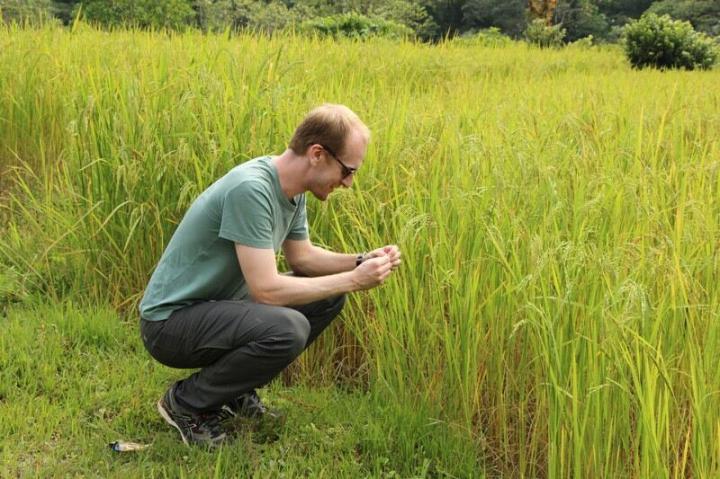New study examines making food supply more resilient to natural shocks

Credit: Photo courtesy of Kyle Davis
As the world grows increasingly globalized, one of the ways that countries have come to rely on one another is through a more intricate and interconnected food supply chain. Food produced in one country is often consumed in another country — with technological advances allowing food to be shipped between countries that are increasingly distant from one another.
This interconnectedness has its benefits. For instance, if the United States imports food from multiple countries and one of those countries abruptly stops exporting food to the United States, there are still other countries that can be relied on to supply food. But, as the coronavirus COVID-19 global pandemic has made abundantly clear, it also leaves the food supply chain — all the steps involved in bringing food from farms to people’s tables across the world — exposed to potential shocks to the system.
A new study published in Nature Food led by the University of Delaware’s Kyle Davis looked at how to ensure that food supply chains are still able to function under these types of environmental shocks and highlighted key areas where future research should be focused. Co-authors on the study include Shauna Downs, assistant professor at Rutgers University’s School of Public Health, and Jessica A. Gephart, assistant professor in the Department of Environmental Science at American University.
Davis said the motivation behind the paper was to understand current knowledge on environmental disruptions in food supply chains and to investigate evidence that disruptions in one step of the food supply chain impact subsequent stages. The steps on the global food supply chain are described in the paper as food production, storage, processing, distribution and trade, retail and consumption.
“Does a disruption in food production get passed through different steps and ultimately impact distribution and trade, all the way down to the consumers?” asked Davis, assistant professor in the Department of Geography and Spatial Sciences in UD’s College of Earth, Ocean and Environment and the Department of Plant and Soil Sciences in UD’s College of Agriculture and Natural Resources who is also a resident faculty member with UD’s Data Science Institute. “If there’s a shock to agriculture on the other side of the world, will you see the effects in your grocery store?”
The environmental disruptions covered in the paper include events like floods, droughts, and extreme heat, as well as other phenomena like natural hazards, pests, disease, algal blooms, and coral bleaching.
Davis said that this work is especially timely — given the unprecedented effects that the COVID-19 pandemic has had on the entire food supply chain — and highlights the importance of understanding how to make global food supply chains function properly under stress.
“COVID-19 has affected all steps in the supply chain simultaneously, from not having enough seasonal workers to harvest the crops to meat processing plants temporarily closing because workers get sick, to hoarding behaviors and runs on grocery stores,” Davis said. “We’ve also seen many people losing their jobs, and as a result, they may not be able to purchase certain foods anymore.”
Researchers have focused on understanding how temperature and precipitation affect staple crops at the production step in the supply chain, Davis said, but how that impacts the rest of the steps in the food supply chain has not been researched thoroughly. Because of this, we don’t have a good grasp of how a suite of disruptions on a variety of food items ultimately impact consumption, food security, and nutrition.
To address these gaps in knowledge, the researchers identified key areas for future research: 1) to understand the shape of a supply chain, meaning its relative number of farmers, distributors, retailers and consumers to identify possible vulnerabilities; 2) to evaluate how simultaneous shocks — such as droughts in two different places — impact the whole supply chain; and 3) to quantify the ability for substitutions to occur within supply chains, like switching cornmeal for flour if there is a wheat shortage.
Ultimately, Davis said this work can help policy makers and businesses make food systems more capable of predicting and absorbing unprecedented shocks.
“As climate change and other sudden global events like pandemics exercise greater influence on food systems,” Davis said, “we will need to continue building resilience into our food supply chain so that we’re able to absorb a disruption that may be bigger than what we’ve seen in the past but still maintain the function of the supply chain — getting food from field to fork.”
###
Media Contact
Peter Kerwin
[email protected]
Original Source
https:/




